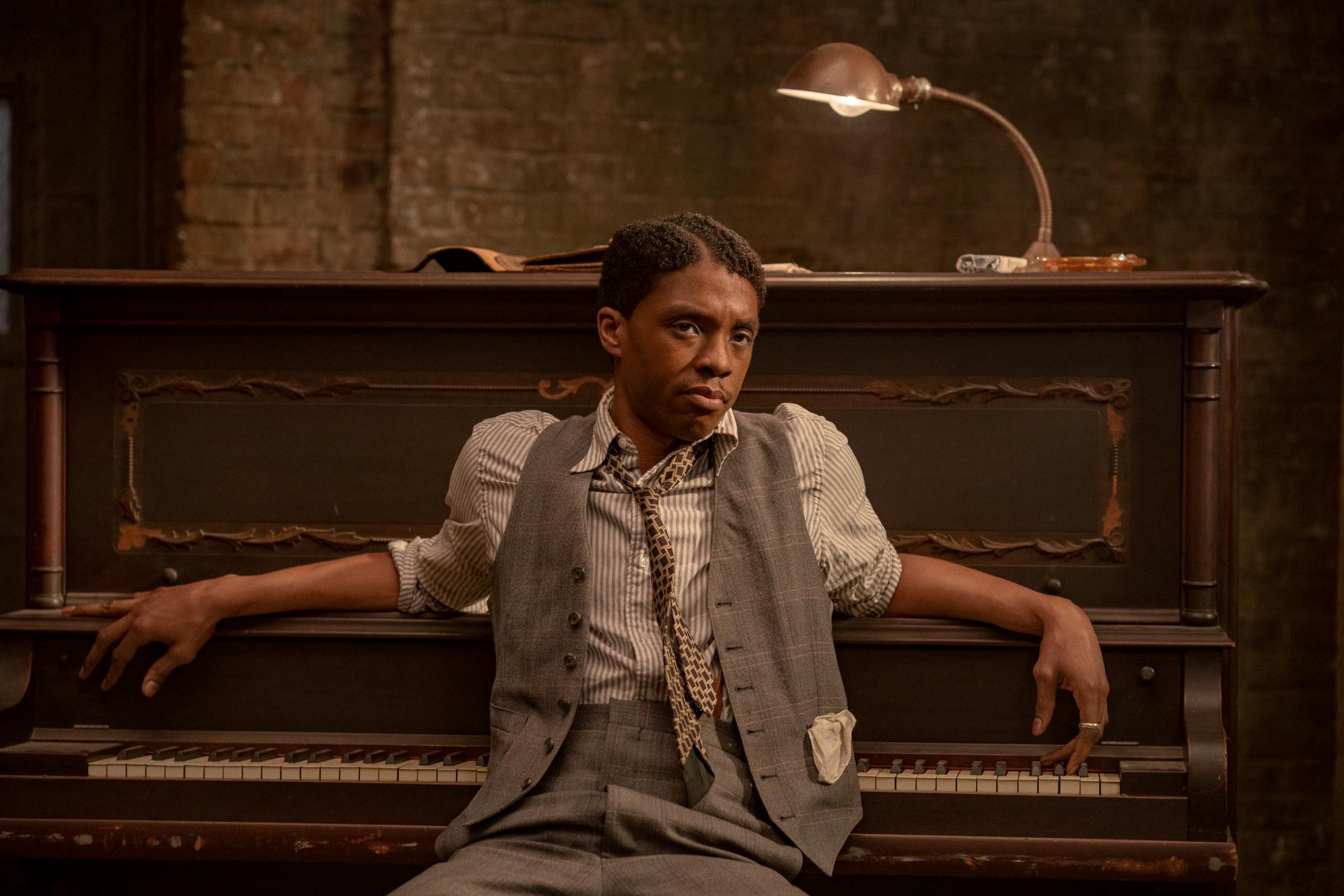The blues are both a musical style and a vibe, a sort of rolling, glistening, down-and-dirty glamour that can’t be faked. As storied blues artist Ma Rainey, Viola Davis slips into that vibe as if it were a fringed silken gown. With her hip-swinging sashay, her eyelids glazed the color of bruised plums, she’s a seductress of everyone who meets her gaze, and she’s the sultry anchor of Ma Rainey’s Black Bottom, George C. Wolfe’s film version of August Wilson’s 1982 play, now streaming on Netflix.
Ma Rainey was a blues pioneer, and part of the first wave of blues artists to commit their voices to record, and Ma Rainey’s Black Bottom takes place during a 1927 recording session in Chicago. Ma, already hugely successful, shows up late—because she can. Her manager, Irvin (Jeremy Shamos), will do anything to placate her; she’s his bread and butter. But as Ma points out during the course of the session, Irvin isn’t a friend to her: he has invited her to his house only once, and that was to sing for his white friends. This detail speaks volumes about even the most cordial relationships between Black artists and the white people who have historically made money off them, though it also underscores another point: Irvin needs Ma more than Ma needs him. Her gifts make her his superior by a mile.
The members of Ma’s band bow to her, too: Cutler (Colman Domingo), the leader, makes it clear that they’re an “accompaniment” band, committed to following wherever Ma’s vocals lead. Bassist Slow Drag (Michael Potts) and pianist Toledo (Glynn Turman) follow that law dutifully. But brash new trumpeter Levee—played by Chadwick Boseman, in one of his final performances—wants to shake things up; he drops bold filigree runs into spaces where Ma wants simplicity. He also has eyes for Ma’s saucy girlfriend, Dussie Mae (Taylour Paige), much to Ma’s simmering annoyance. His boldness—right down to his recent purchase of a pair of dazzling yellow shoes—is so charismatic that it’s threatening even to a superstar like Ma.

Levee is a brilliant musician but also a troubled soul. When his bandmates accuse him of kowtowing to the record label’s white boss, he shuts them down with a chilling story from his childhood. Boseman’s performance is terrific; it has a tense, metallic edge, as if Levee’s musical talents, his sunny buoyancy and his justified rage were all jabbing at each other every minute, resulting in a jangle of noise in his head. And Turman, as the gentle, well-read Toledo, who both stands up to Levee and tries to guide him, gives a quieter but equally potent performance. Their scenes together capture both the casual camaraderie and the simmering tension between musicians who have to put their differences aside to play with one another.
Ma Rainey’s Black Bottom is part of Wilson’s 10-play Pittsburgh Cycle, focusing on the experiences of Black Americans throughout the 20th Century, and watching Wolfe’s reimagining, it’s easy to imagine how dazzling this show must have been onstage. The film occasionally suffers from the slight stiffness that often afflicts movies adapted from theater. But to watch these actors is pure pleasure, and with their help, Wolfe captures the danger and glamour, the unrest and the go-for-broke joy, of artists who were making music on the edge in the 1920s. When Davis’ Ma steps up to the microphone to sing one of her brazen, elegantly salacious numbers—after sucking down a bottle of the Coca Cola she’s written into her contract—you’re not sure if the heavens are ready to open up with a gift of sun or if the ground beneath her feet will crack apart to reveal the flames of hell. She’s perched right between the two possibilities, holding steady, trusting in nothing but the bold, after-midnight certainty of her voice. It’s a star that never steers her wrong.
More Must-Reads from TIME
- Donald Trump Is TIME's 2024 Person of the Year
- Why We Chose Trump as Person of the Year
- Is Intermittent Fasting Good or Bad for You?
- The 100 Must-Read Books of 2024
- The 20 Best Christmas TV Episodes
- Column: If Optimism Feels Ridiculous Now, Try Hope
- The Future of Climate Action Is Trade Policy
- Merle Bombardieri Is Helping People Make the Baby Decision
Contact us at letters@time.com